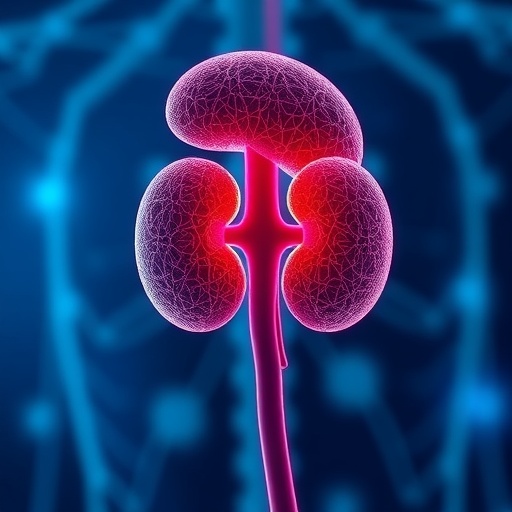In the realm of nephrology, groundbreaking clinical trials and studies have recently unveiled promising advances in the management and treatment of kidney diseases, with profound implications for patient outcomes and healthcare strategies. These developments, emerging from rigorous multicenter randomized trials and meta-analyses, offer new hope for individuals with conditions ranging from chronic kidney disease (CKD) and acute kidney injury (AKI) to kidney transplantation. The integration of innovative therapeutic approaches and cutting-edge predictive technologies marks a significant milestone in renal medicine.
One notable discovery stems from the PISCES trial, a large-scale multicenter randomized study involving 1,228 hemodialysis patients across 26 dialysis units in Canada and Australia. This research demonstrated a remarkable reduction—approximately 50%—in major cardiovascular events among participants taking omega-3 polyunsaturated fatty acid supplements, commonly known as fish oil, compared to those receiving placebo. Importantly, the study highlights the role of non-traditional cardiovascular risk factors unique to dialysis patients, alongside traditional risks, in precipitating serious cardiac complications. These findings emphasize the potential cardioprotective properties of omega-3 fatty acids as an adjunct therapy in dialysis, although mechanistic insights remain to be elucidated in subsequent research.
Acute kidney injury (AKI) presents additional clinical challenges, especially in hospitalized patients where dialysis initiation is often a critical decision point. The LIBERATE-D trial tackled this by comparing a conservative dialysis initiation strategy—triggered by specific clinical and metabolic criteria—with the conventional approach of thrice-weekly hemodialysis. Remarkably, the conservative strategy not only reduced dialysis frequency but also enhanced renal recovery rates at hospital discharge, with 64% of patients regaining kidney function in contrast to 50% under conventional care. This paradigm shift suggests that less aggressive dialysis initiation might foster renal recuperation, underscoring the need for personalized and adaptive dialysis protocols tailored to AKI pathophysiology.
Artificial intelligence (AI) has made inroads into nephrology through a randomized clinical trial exploring AI-driven electronic alerts for early detection and management of AKI. An AI-based predictive model, repurposed from marketing analytics, was leveraged to identify patients most likely to benefit from clinician-directed alerts. Although the intervention did not significantly alter the progression to severe kidney injury or dialysis dependency, it notably reduced nephrology consultations and hospital readmissions. These outcomes hint at the utility of targeted alert systems in enhancing healthcare efficiency and minimizing provider alert fatigue, a pervasive challenge in clinical decision support systems.
In the specialized field of kidney transplantation, the OPTIMIZE study examined immunosuppressive regimens tailored for older transplant recipients. This demographic typically exhibits lower rejection rates but heightened susceptibility to adverse medication effects. The trial compared a reduced-intensity regimen comprising everolimus plus reduced-dose tacrolimus versus the standard mycophenolate mofetil and tacrolimus combination. While the modified protocol was deemed safe, it did not confer superior survival or kidney function outcomes over a two-year period. These findings stress the complexity of balancing immunosuppression to mitigate side effects without compromising graft survival in elderly transplant populations.
Therapeutic advances have also emerged in the management of type 2 diabetes complicated by cardiovascular disease and CKD. The SURPASS-CVOT trial compared tirzepatide—a novel dual agonist targeting glucose-dependent insulinotropic polypeptide and glucagon-like peptide-1 receptors—against dulaglutide, which exclusively activates the glucagon-like peptide-1 receptor. Results revealed that tirzepatide significantly decelerated kidney function decline and curtailed the incidence of major renal events among high-risk individuals. This underscores the advantage of dual incretin receptor agonism in providing nephroprotection, potentially reshaping treatment paradigms in complex diabetic populations.
Sodium-glucose co-transporter 2 (SGLT2) inhibitors, a class of drugs initially developed for glycemic control in diabetes, continue to demonstrate robust renoprotective effects that transcend diabetic status. A comprehensive meta-analysis synthesizing data from eight large placebo-controlled trials with over 58,000 participants revealed that SGLT2 inhibitors reduce the risk of kidney disease progression, mortality, and hospitalization in CKD patients regardless of diabetes presence or albuminuria levels. Notably, patients with higher proteinuria derived greater absolute renal benefits, yet even those with lower urinary albumin levels experienced significant reductions in mortality and hospital admissions. These findings advocate for broadening clinical guideline recommendations to encompass wider use of SGLT2 inhibitors, potentially dismantling previous restrictive criteria based on albuminuria thresholds.
Together, these advancements reflect a nuanced understanding of renal pathophysiology and a patient-centric approach that incorporates novel pharmacologic agents, biomarker-driven strategies, and technology-assisted clinical decision-making. The convergence of these domains not only aims to prolong kidney function and improve quality of life but also to reduce the substantial cardiovascular morbidity and mortality burden that plagues patients with renal impairment.
Future research directions will likely focus on elucidating the underlying biological mechanisms of observed clinical benefits—particularly regarding omega-3 fatty acids and dual incretin receptor agonists—while optimizing dialysis initiation criteria to enhance renal recovery in AKI. Furthermore, expanding AI applications in nephrology holds promise for personalized medicine, yet necessitates validation through larger and more diverse cohorts to ensure generalizability and efficacy. In transplantation, tailoring immunosuppression regimens for elderly recipients remains an ongoing challenge warranting refined approaches that balance efficacy with safety.
These studies collectively represent a pivotal step forward in nephrology, offering evidence-based pathways to mitigate the progression of kidney disease, mitigate cardiovascular risk, and improve post-transplant outcomes. As the nephrology community eagerly anticipates validation and implementation of these findings, the ultimate beneficiaries will be the millions worldwide battling kidney disease, who stand to gain from these innovations in care.
Subject of Research: Advances in treatment strategies and clinical outcomes in chronic kidney disease, acute kidney injury, kidney transplantation, and associated cardiovascular complications.
Article Title: Emerging Clinical Advances in Nephrology: Toward Improved Cardiovascular and Renal Outcomes
News Publication Date: Not specified
Web References:
American Society of Nephrology: www.asn-online.org
Keywords: Chronic Kidney Disease, Acute Kidney Injury, Hemodialysis, Cardiovascular Risk, Omega-3 Fatty Acids, Dialysis Strategies, Artificial Intelligence, Kidney Transplantation, Immunosuppression, Type 2 Diabetes, SGLT2 Inhibitors, Tirzepatide, Clinical Trials
Tags: acute kidney injury treatmentadjunct therapies for kidney diseasescardiovascular risk factors in kidney patientschronic kidney disease managementclinical trials in nephrologyhemodialysis patient outcomeskidney health advanceskidney transplantation researchmulticenter randomized studiesomega-3 fatty acids in dialysispredictive technologies in nephrologyrenal medicine innovations





